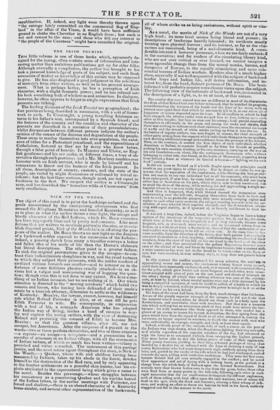THE IRISH TOURIST.
THIS little volume is one of those books which, apparently de- signed for the young, often contain more of information and inte- resting matter than ambitious publications got up for older folks. Although avowedly a compilation, the author has brought to his task a personal knowledge of parts of his subject, and such fresh accessions of matter as knowledge of this nature may be supposed to give. He has also displayed a good judgment in the selections of materials from other writers, as well as in his general arrange- ment. What is perhaps better, he has a perception of Irish character, with a slight dramatic power; and he has infused into his book something both of wholeness and animation. In dialogue, however, he often appears to forget in single expressions that Irish peasants are talking. The leading divisions of the Irish Tourist are geographical ; the four prosinces being described in succession, with a sort of frame- work to each. In Connaught, a young travelling Irishman re- turns to his father's seat, accompanied by a Spanish friend; and the features of the country and the condition and character of the peasants are described in a narrative of their perambulations; whilst discussions between different persons indicate the author's opinion of the causes of the distress and degradation of the people. These seem to resolve themselves into over-population, the exist- ence of tithes for a Protestant priesthood, and the superstitions of Catholicism, fostered as they are by many who know better, through a false point of honour. In Munster and Ulster, an Eng- lish gentleman and his son make, at different titres, a tour of ob- servation through each province; and a Mr. Mowbray rambles over 'Allister with an Irish servant, who is made by himself and his connexions to throw out the humour of the Irish peasant. In all these, descriptions of scenery, customs, and the state of the people, are varied by slight discussions or enlivened by trivial in- cidents; but the last three sections, though good, are not equal in freshness to the first. We suspect the author is a Connaught man, and has described the" houseless wilds of Cunnemara" from early recollection.


























 Previous page
Previous page